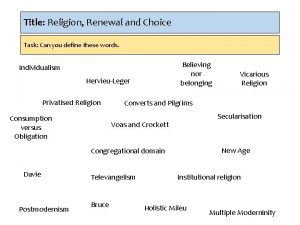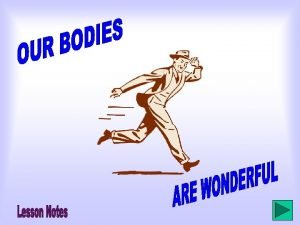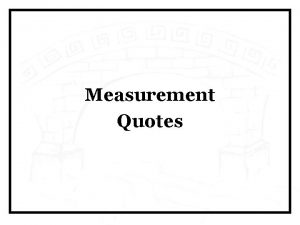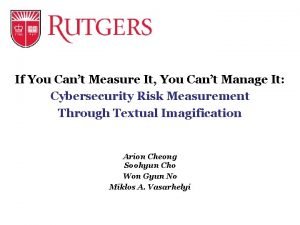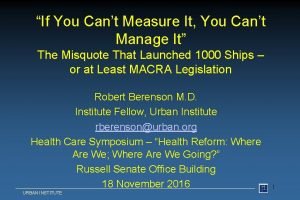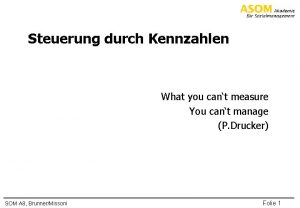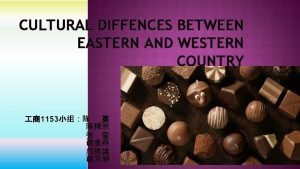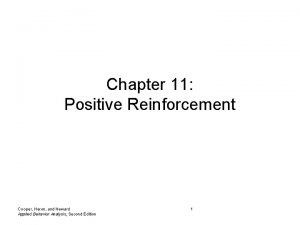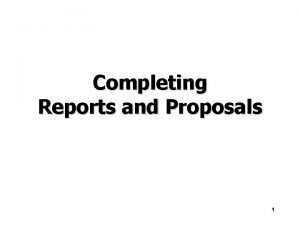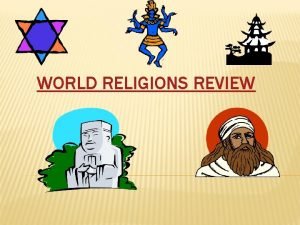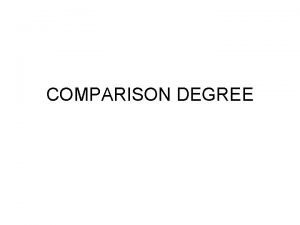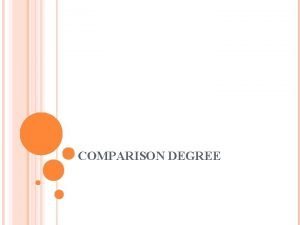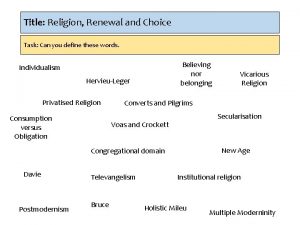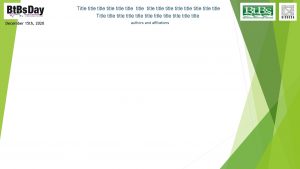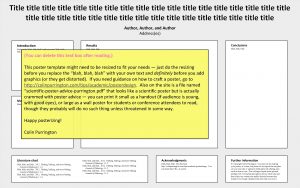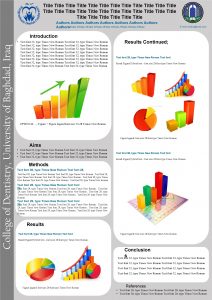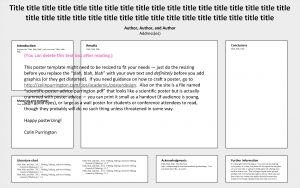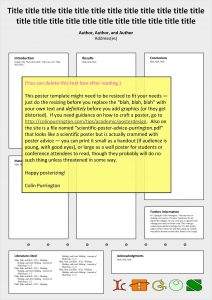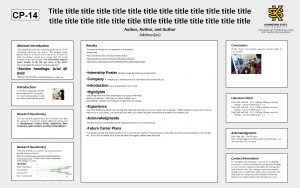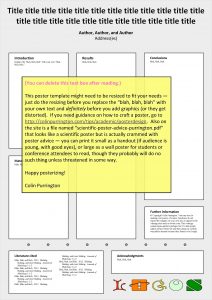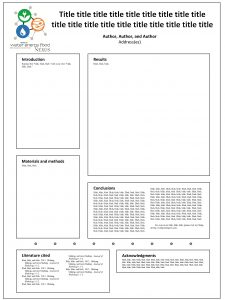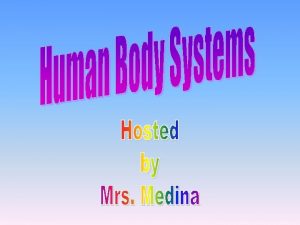Title Religion Renewal and Choice Task Can you
















- Slides: 16

Title: Religion, Renewal and Choice Task: Can you define these words. Believing nor belonging Individualism Hervieu-Leger Privatised Religion Consumption versus Obligation Converts and Pilgrims Secularisation Voas and Crockett New Age Congregational domain Davie Postmodernism Televangelism Bruce Vicarious Religion Institutional religion Holistic Mileu Multiple Moderninity

Title: Religion, Renewal and Choice Apply your knowledge to Questions. Evaluate your success and improve.

Apply your knowledge to Questions. Task: Answer the following Question. Outline & explain two reasons why figures on attendance at mainstream churches overstate the degree of secularisation in Britain today. (10 marks) P – Vicarious Religion: Spiritual Health E – Davie, Diana, Anders Brevic E – Tip of an iceberg, evidence of believing without belonging. L – Shows that Secularisation is not occurring, attendance is falling. P – Spiritual shopping E– E– L–

Title: Religion, Renewal and Choice Task: Can you define these words. Vicarious Religion Privatised Religion Individualism Consumption versus Obligation Converts and Pilgrims Congregational domain Holistic Mileu Believing nor belonging Davie Secularisation Hervieu-Leger Bruce Voas and Crockett Televangelism New Age Postmodernism Multiple Modernitites Institutional religion Day Woodhead

Apply your knowledge to Questions. Task: Answer the following Question. Applying material from Item A and your own knowledge, evaluate the impact of postmodernity on religious and spiritual beliefs and practices. (20 marks) 17 -20 Answers in this band will show sound, conceptually detailed knowledge of a range of relevant material on postmodernity impact. Sophisticated understanding of the question and of the presented material will be shown. Appropriate material will be applied accurately and with sensitivity to the issues raised by the question. Analysis and evaluation will be explicit and relevant. Evaluation may be developed for example through a debate 13 -16 Answers in this band will show accurate, broad and/or deep but incomplete knowledge. Understands a number of significant aspects of the question; good understanding of the presented material. Application of material is largely explicitly relevant to the question, though some material may be inadequately focused. Some limited explicit evaluation.

Apply your knowledge to Questions. Task: Answer the following Question. Applying material from Item A and your own knowledge, evaluate the impact of postmodernity on religious and spiritual beliefs and practices. (20 marks) Some sociologists claim that society has entered a new era, that of postmodernity, in which religion and spirituality take on new forms. In postmodern society, tradition loses its influence over people. Consumption and choice become more important, and people are free to choose their identity and their beliefs. Postmodern society is increasingly globalised, and the media and information technology become much more important, for example moving religious ideas and images out of their tradition physical home in churches and making them available around the globe. However, other sociologists are that these trends merely promote secularisation.

Apply your knowledge to Questions. Task: Answer the following Question. Applying material from Item A and your own knowledge, evaluate the impact of postmodernity on religious and spiritual beliefs and practices. (20 marks) Some sociologists claim that society has entered a new era, that of postmodernity, in which religion and spirituality take on new forms. In postmodern society, tradition loses its influence over people. Consumption and choice become more important, and people are free to choose their identity and their beliefs. Postmodern society is increasingly globalised, and the media and information technology become much more important, for example moving religious ideas and images out of their tradition physical home in churches and making them available around the globe. However, other sociologists are that these trends merely promote secularisation.

Apply your knowledge to Questions. Task: Answer the following Question. Introduce: Introduce your point. (AO 1) Describe: Offer substantial developed description (AO 1) Evidence: Provide evidence to support your information. (AO 3) Explain: Develop your answer further. Link to the Question. (AO 2) Analyse: Providence evaluation that supports or criticises. (Ao 3) Link: Link back to your question. (AO 2)

Apply your knowledge to Questions. Task: Applying material from Item A and your own knowledge, evaluate the impact of postmodernity on religious and spiritual beliefs and practices. (20 marks) Item A suggests that “postmodern society is increasingly globalised” and that “religion is taking on new forms”. There is evidence to support this theory from the postmodern perspective, the expansion of the ‘electronic church’ and televangelism. These new practices only possible in a postmodern society, remove ‘believers’ from a physical church, allowing them to express their faith without attending church. This has led to religion becoming de-institutionalised meaning it is detached from religious institutions, clearly showing the impact of postmodernity on religious and spiritual beliefs and practices. The theory is supported by Hellend (2000) which distinguished between two kinds of internet activity, which he calls religion online and online religion. This sees online religion as a radical new alternative that may be replacing religion. However, evidence from Hoover would argue against this theory that online religion supplements their church based activities. The electronic church would suggest that postmodernity has had some impact on religious and spiritual beliefs and practices.

Apply your knowledge to Questions. Task: Applying material from Item A and your own knowledge, evaluate the impact of postmodernity on religious and spiritual beliefs and practices. (20 marks) I D E A L Item A suggests that “postmodern society is increasingly globalised” Ao 2 and that “religion is taking on new forms”. There is evidence to support this theory from the postmodern Ao 1 perspective, the expansion of the ‘electronic church’ and televangelism. These new practices only possible in a postmodern society, remove ‘believers’ from a physical church, allowing them to express their faith without attending church. This has led to religion becoming de-institutionalised meaning it is Ao 2 detached from religious institutions, clearly showing the impact of postmodernity on religious and spiritual beliefs and practices. The theory is supported by Hellend (2000) which distinguished Ao 3 between two kinds of internet activity, which he calls religion online and online religion. This sees online religion as a radical new alternative that may be replacing religion. However, evidence from Hoover would argue against this theory that Ao 3 online religion supplements their church based activities. The electronic church would suggest that postmodernity has had Ao 2 some impact on religious and spiritual beliefs and practices.

Apply your knowledge to Questions. Task: Applying material from Item A and your own knowledge, evaluate the impact of postmodernity on religious and spiritual beliefs and practices. (20 marks)

Apply your knowledge to Questions. Task: Applying material from Item A and your own knowledge, evaluate the impact of postmodernity on religious and spiritual beliefs and practices. (20 marks) Clearly there is evidence to suggest that postmodernity has had an impact on religious and spiritual beliefs and practices. Through the concepts of neither believing nor belonging, obligation and institutional religion show that there is an impact. We have religious beliefs that are in fluctuation, evolving with an ever changing world. However, there is evidence that show that these developments mean religion and spirituality are thriving as well as evidence that show that they are symptoms of secularisation. Ultimately, either way, there is an impact.

Apply your knowledge to Questions. Task: Applying material from Item A and your own knowledge, evaluate the impact of postmodernity on religious and spiritual beliefs and practices. (20 marks) Clearly there is evidence to suggest that postmodernity has had an impact on religious and spiritual beliefs and practices. Through the concepts of neither believing nor belonging, obligation and institutional religion show that there is an impact. We have religious beliefs that are in fluctuation, evolving with an ever changing world. However, there is evidence that show that these developments mean religion and spirituality are thriving as well as evidence that show that they are symptoms of secularisation. Ultimately, either way, there is an impact.

Describe information and apply it to a question. Task: Working with the person next to you – Complete the relevant section of the sheet – aim to complete the section appropriate to your level. More challenge CHALLENGE: Answer down to the Question “Democratisation and denazification were more successful in the East. How far do you agree? ” Use evidence from the sources to support or challenge this opinion.

Mark Knowledge AO 1 Application AO 2 Evaluation AO 3: Analysis will be explicit and relevant. Developed through debate between perspectives. Analysis will be clearly explained. Conclusions drawn. 17 -20 AO 1: Conceptually detailed knowledge of a range of material. AO 2: Appropriate material applied accurately and with sensitivity to the issues. 13 -16 AO 1: Accurate, broad but incomplete knowledge of a number of aspects. AO 2: Application is largely explicit and relevant though some may be less so. AO 3: Limited explicit evaluation. And/or some appropriate analysis. 9 -12 Ao 1: Largely accurate knowledge but limited range and depth. Superficial understanding of material. AO 2: Application is general with limited relevance or applied narrowly. AO 3: Evaluation will be limited, tending towards description. WWW: EBI:

 Religion renewal and choice
Religion renewal and choice If you think you can you can poem
If you think you can you can poem If you can imagine it you can achieve it
If you can imagine it you can achieve it If you cant measure it you can't improve it
If you cant measure it you can't improve it If you can't measure it you can't manage it
If you can't measure it you can't manage it If you cannot measure it you cannot manage it
If you cannot measure it you cannot manage it Goldene bilanzregel
Goldene bilanzregel Secneer
Secneer Good choice or bad choice
Good choice or bad choice Circular reasoning aba
Circular reasoning aba Completing reports and proposals
Completing reports and proposals Religion title page
Religion title page Tiered task bias task
Tiered task bias task Title title
Title title You can tell harris about it just ____(easily) as i can.
You can tell harris about it just ____(easily) as i can. You can tell harris about it just ____(easily) as i can
You can tell harris about it just ____(easily) as i can How to be more impressive 1+1=2
How to be more impressive 1+1=2
